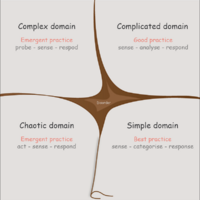The Cynefin Framework
This article will introduce the Cynefin framework and its underlying practices, which can be used for sense- and decision making in a complex and complicated world. [1] The framework is developed by David J. Snowden (born 1 April 1954), and is used by leaders to determine operative context so they can make appropriate choices.
The Cynefin framework splits the issues that faces leaders into five contexts; simple, complicated, complex, chaotic and disorder. Each of which requires different approaches to leadership style. [1]
Contents |
History
The Cynefin model
The Cynefin framework
1. Simple contexts (known knowns)
The domain of best practice, known-knowns, here we know exactly what we are doing and we have done it before, so we sense, categorize and responds (S-C-R)
- Nature:
Familiar, certain Constraints are understandable to all Understandable solutions
2. Complicated contexts (known unknowns)
The domain where we do not know what is going on, but we know that we can analyse what has happened and figure it out. We are sense, analyse and responds (S-A-R)
3. Complex contexts (unknown unknowns)
In the complex domain we can not determine what will be the outcome, but we can run some experiments and see if they will move us in the right direction. We probe, sense and respond (P-S-R).
In this domain we can only understand what is happening in hindsight [1].
4. Chaotic contexts (unknowable unknowns)
In this domain, the domain of unknowables, it does not make sense to search for answers, no patterns exist - only turbulence. We act (do something), we sense where stability emerges and then we respond by working towards complexity (A-S-R)[1].
Disorder (not determined)
Examples of contexts
- Examples of simple contexts
- Examples of complicated contexts
- Examples of Complex contexts
- Examples of Chaotic contexts
- Examples of Disorder
Examples of uses
- Cynefin used in Ergonomics
Criticism
- Critical reviews of the Cynefin Framework
- Risk of oversimplifying the problems
Additional reading
- Article: Harvard business review: Snowden, David J., and Mary E. Boone. "A leader's framework for decision making." [1]
- Article: Snowden, Dave. "Strategy in the context of uncertainty." Handbook of Business strategy 6.1 (2005): 47-54. [2]
- Cynefin 101, an article by Greg Brougham http://www.infoq.com/articles/cynefin-introduction
- The new dynamics of strategy: sense-making in a complex and complicated world http://alumni.media.mit.edu/~brooks/storybiz/kurtz.pdf
- Video: (Youtube): The Cynefin Framework http://www.youtube.com/watch?v=N7oz366X0-8
- Article archive: cognitive-edge.com http://cognitive-edge.com/library/more/articles/
- Article: 'Cynefin Centre: Life after IBM' 2005, KM World, 14, 7, pp. 1-26, Business Source Premier, EBSCOhost, viewed 14 November 2014.
- Article: Elford, W. (2012). A multi-ontology view of ergonomics: applying the Cynefin Framework to improve theory and practice. Work, 41, 812.
